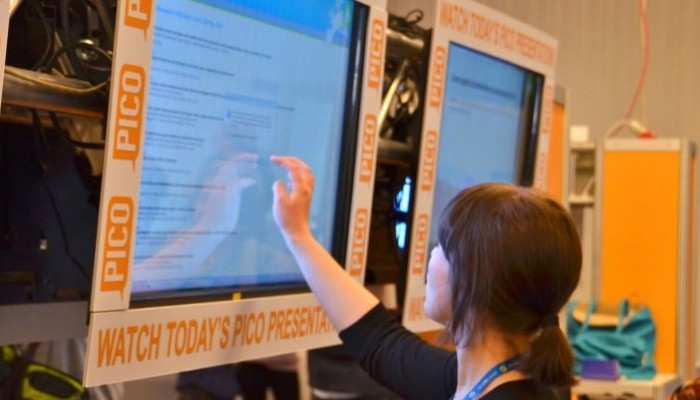Like everyone else, in the beginning I was skeptical of the newly introduced presentation format at the EGU – the PICO sessions. PICO stands for Presenting Interactive Content. Half talk, half poster – this is a new design that demands a completely new and unfamiliar preparation of the presenter, and yes admittedly at first this meant additional work. However, already during the creation of my first PICO presentation, I realized that the scientific content can be filled with much more life than in a poster, and with much more information than in a talk. This made me change my opinion quickly. Before the PICO gets presented, the presenter has the chance to advertise it in the so called ‘2-minute madness’. Usually they are less crazy than it sounds, but the idea is great – to force scientists to minimize the story to the key facts. Let’s be honest, nobody reads all the abstracts in the program.

PICO presentations at EGU 2014. (Credit: EGU/Stephanie McClellan)
So with this short advertisement the scientists have the chance to get more uninformed people into visiting their research. Later, during the PICO session, I noticed that most attendees are keen to hear more about your scientific adventure. This means, it starts like a regular oral presentation. However, pretty soon, the people start to ask specific or sometimes very specific questions like with a poster. Then you have the chance to guide the presentation into another direction, but you still have your supporting tools at your fingertips – like videos, animations, high resolution graphics, large tables, etc. Next, the questions lead into a conversation and quickly transform into a discussion, which usually attracts other scientists. A big advantage is that questions are asked at the very moment they come up, while presenting the respective slide and do not need to wait until after the talk.
For me the PICO sessions are a valuable addition to the traditional formats. What is missing? Maybe the possibility to access websites as well. Maybe a session mixture of talks, posters, and PICOs. Anyhow, I think particularly the ESSI division should push for PICOs. I cannot think of a better format to show results like in posters or talks, but at the same time have the opportunity to dig much deeper into e.g. programming languages, IT infrastructures, visualization, etc. And it is a perfect showcase of how nowadays topics – in this case scientific presentation types – are positively influenced due to informatics. ESSI should be upfront with these developments as well.
Please watch the non-interactive PICO presentation here. The interactive version was uploaded to the EGU site.
